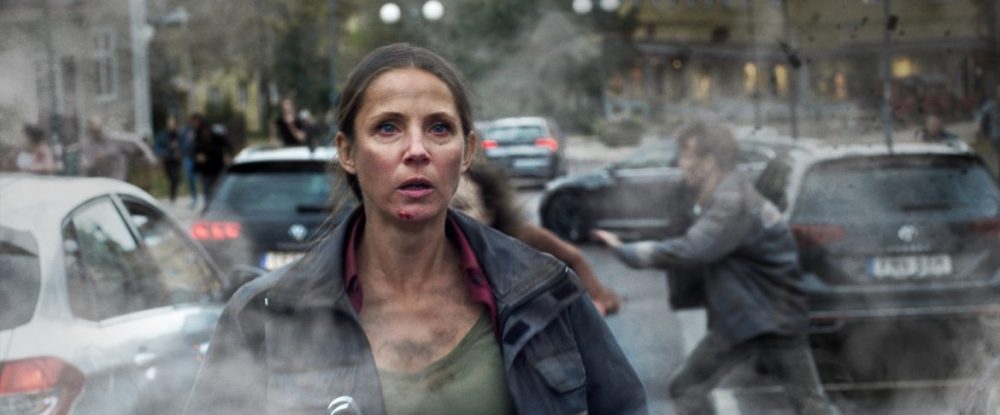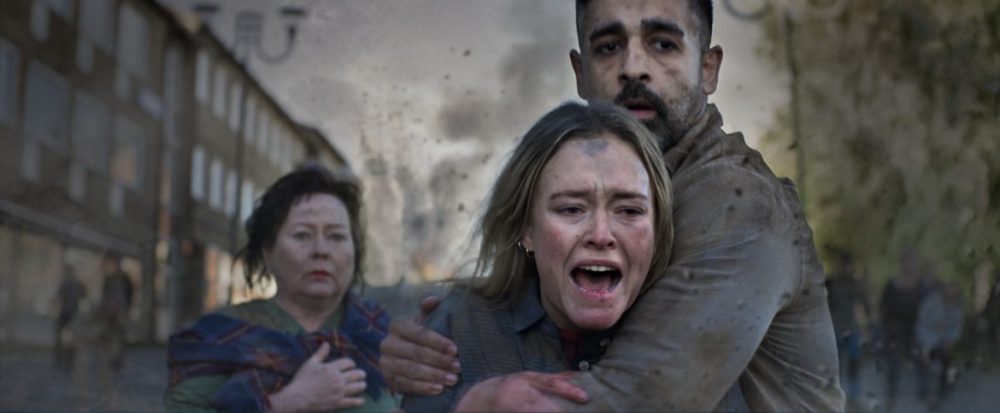TL;DR
"The Abyss" is Sweden's first UHD release, a high-stakes thriller where a mining security manager must save her town from a catastrophic mine collapse. This ambitious film, despite a modest budget by Hollywood standards, boasts impressive practical effects and strong performances, particularly from Tuva Novotny as the lead. It skillfully balances family drama with disaster, building genuine suspense and delivering a powerful cinematic experience that marks a significant moment for Swedish genre film. Want to know if this intense Swedish disaster flick is worth your time? Dive into the full review to find out!
The Abyss is currently available on Netflix and has also been released as Sweden’s first UHD edition.
Frigga (Tuva Novotny) serves as the security manager for the Kiruna mine, while simultaneously managing her responsibilities towards her two teenage children, Simon and Mica (Felicia Maxime). Unexpectedly, her new boyfriend Dabir (Kardo Razzazi) arrives ahead of schedule, leading to awkward encounters with her ex-husband Tage (Peter Franzén). Suddenly, seismic activity rocks the town of Kiruna, and Frigga realizes the entire city is on the verge of collapsing into the mine. With time running out, she must strive to ensure everyone’s safety before disaster strikes.

In June, during my visit to Brussels, I had the opportunity to interview director and screenwriter Richard Holm about the film’s genesis and the collaborative screenwriting process with his son, Robin Sherlock Holm. Anticipating its release, I was genuinely hoping for a positive viewing experience, as the project seemed to stem from genuine passion. Thus, I entered the cinema with considerable anticipation.
Swedish genre film has often been a term of derision. Premiered films have frequently faced ridicule and been shunned by certain circles. A particularly disheartening interview exists with Anders Jacobsson (director of Evil Ed), where he faced condescension for creating a Swedish splatter film. Similar experiences were shared by Mats Helge (Ninja Mission) and, initially, Anders Nilsson, before gaining wider acceptance with the Johan Falk films. However, with the current presence of two Swedish horror films, Canceled and Karusell, in theaters, the Swedish film industry appears to have finally acknowledged that film serves as a medium for entertainment, extending beyond social realism, Nordic Noir, and crime dramas.
The Abyss is a remarkably ambitious film. While its budget of approximately 90 million Swedish kronor may seem modest by American standards, it represents one of the largest budgets in Swedish film history. For context, a low-budget film in the USA typically commands at least three times that amount.
Richard Holm and his team have effectively utilized the available funds, prioritizing a smaller number of high-quality, visually impressive effects shots. Commendable is the demonstrated commitment to employing practical effects wherever feasible.
Irrespective of the quantity and scale of effects, a film’s impact hinges on the audience’s connection with its characters. Tuva Novotny delivers a compelling performance as Frigga, portraying the challenges of balancing career and family life. Notably, the film avoids simplistic characterizations, presenting a nuanced portrayal. Peter Franzén, as ex-husband Tage, avoids the stereotypical portrayal of a jealous antagonist, revealing layers of character and genuine affection for Frigga through his performance and dialogue. Kardo Razzazi as Dabir and Felicia Maxime as daughter Mica also deserve recognition for their believable and engaging portrayals.
The Abyss follows a conventional narrative structure, initially hinting at underlying issues, with the story progressively unfolding. The time dedicated to establishing the family dynamic at the film’s outset proves crucial for fostering emotional investment in the characters. The pacing is well-managed, and the framing story involving the search for Simon effectively unifies the narrative. My prior unfamiliarity with the actor playing Simon heightened the film’s suspense; therefore, I will refrain from revealing his identity in this review.

Regrettably, the performances of some supporting characters fall short, and certain sequences feel somewhat prolonged. A particular scene near the end, while conceptually sound, felt protracted, with the characters remaining static for too long, suggesting a missed opportunity for a more impactful choice. This is a minor critique, but it did detract slightly from the experience.
In conclusion, The Abyss fulfilled my expectations on multiple levels. The film maintains suspense and tension throughout. The filmmakers demonstrate boldness, resulting in one of the most intense and impactful death scenes I have witnessed, effectively underscoring the peril faced by the characters. The sound design is particularly impressive, and upon leaving the theater, I felt I had experienced a unique and compelling cinematic event.
Swedish genre film has firmly established its presence. While budgetary constraints may exist compared to other countries, the requisite knowledge and commitment are evident. When resources are strategically allocated, the outcome can be exceptional, making this film a must-see. While Crazy Pictures (Ufo Sweden, En Blomstertid nu kommer) paved the way, their scripts often faltered in the third act – a flaw absent in The Abyss.
Interested in learning about the special effects of The Abyss? Take a look at our behind-the-scenes report from Brussels.

